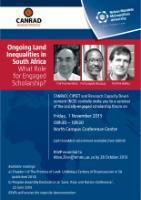
Rhodes University academics Professor Fred Hendricks and Professor Kirk Helliker will present a seminar at the Nelson Mandela Metropolitan University (NMMU) on 1 November titled “Ongoing land inequalities in South Africa: what role for engaged scholarship?” along with Professor Lungisile Ntsebeza of the University of Cape Town.
Today, Professor Hendricks, Helliker and Ntsebeza will be presenting at Red Location Museum, New Brighton at 18:00, as part of The Herald newspaper and NMMU Community Dialogue. The title of the talk is “Beyond Black Poverty and White Wealth, can Land Reform create a more equal society? Assessing the impact of the 1913 Land Act Today”.
The NMMU session is hosted by CANRAD, CIPSET and Research Capacity Development on the NMMU campus. There will also be a book launch of The Promise of Land: Undoing a Century of Dispossession in South Africa, which Prof Hendricks and Prof Helliker, co-authored with Prof Lungisile Ntsebeza, Director and Holder of the AC Jordan Chair in African Studies and the NRF Research Chair in Land Reform and Democracy in South Africa at the Centre for African Studies, UCT.
According to Prof Hendricks, the book explores the many dimensions of the crisis with the aim of encouraging meaningful debates on alternative approaches. The starting point for this book is that current land reform policies in the country fail to take the colonial context of division and exclusion into account.
In analysing urban, commercial farming and communal areas the book argues for a fundamental change in approach to move beyond the impasse in both policy and conceptualising of land, he said.
Arguing that the transition to democracy in 1994 has not translated into a meaningful process of decolonisation in South Africa, the book suggests that the very structures of colonialism and apartheid remain intact, since racial inequalities in both access to and ownership of land continue today.
With state-driven attempts at land reform having failed to meet even their own targets, a fundamental change in approach is necessary for South Africa to move beyond the deadlock that prevails between the objectives of the policy and the means for realising them.
According to the authors, social movements have a critical role to play in initiating the necessary changes, both in respect of access to land and in influencing broader policy options. Struggles from below are crucial for rethinking purely statist efforts at land reform and the book grapples with the interplay between oppositional campaigns of social movements and the state’s policies and responses.
According to Prof Hendricks, the book flows out of a SANPAD funded research project and was launched at a June conference of social movements in Cape Town, ‘Land, Race and Nation’.
“The launch is envisaged to hopefully provide additional marketing for the book by focusing on the vital themes covered in the book regarding the impasse that we are in in respect of land reform. There is no hope that the current policy and the way it is implemented will resolve the complexities around the land question,” Prof Hendricks said.
He explained that the seminar on Friday deals with the concept of engaged scholarship – of individuals being engaged in struggles around land and writing about them – so that scholarship also advances these struggles.
“It is about the links between scholarship and struggles for land in urban areas, commercial agricultural areas and the communal areas of South Africa,” he said.
By Sarah-Jane Bradfield
